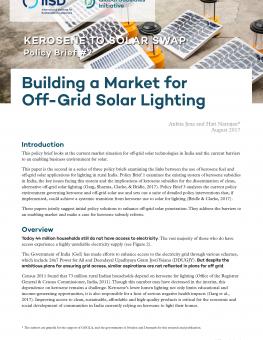
Kerosene to Solar Swap Policy Brief 2: Building a Market for Off Grid Solar Lighting
This policy brief looks at the current market situation for off-grid solar technologies in India and the current barriers to an enabling business environment for solar.
This policy brief looks at the current market situation for off-grid solar technologies in India and the current barriers to an enabling business environment for solar.
This paper is the second in a series of three policy briefs examining the links between the use of kerosene fuel and off-grid solar applications for lighting in rural India. Policy Brief 1 examines the existing system of kerosene subsidies in India, the key issues facing this system and the implications of kerosene subsidies for the dissemination of clean, alternative off-grid solar lighting. Policy Brief 3 analyzes the current policy environment governing kerosene and off-grid solar use and sets out a suite of detailed policy interventions that, if implemented, could achieve a systemic transition from kerosene use to solar for lighting.
These papers jointly suggest initial policy solutions to enhance off-grid solar penetration. They address the barriers to an enabling market and make a case for kerosene subsidy reform.
You might also be interested in
The United Kingdom, New Zealand, and Colombia Join Coalition to Phase Out Fossil Fuel Subsidies
Today on the sidelines of the UN Climate Conference in Baku (COP 29), the United Kingdom, New Zealand, and Colombia joined the international Coalition on Phasing Out Fossil Fuel Incentives Including Subsidies (COFFIS).
COP 29 Must Deliver on Last Year’s Historic Energy Transition Pact
At COP 29 in Baku, countries must build on what was achieved at COP 28 and clarify what tripling renewables and transitioning away from fossil fuels means in practice.
How Indonesia's Incoming President Can Advance the Transition to Clean Energy
With Prabowo Subianto inaugurated as Indonesia’s President, speculation abounds about the new administration’s commitment to the clean energy transition and climate targets, given Prabowo’s positioning as the “continuity candidate.” The question is, what, exactly, will be continued?
Public Financial Support for Renewable Power Generation and Integration in the G20 Countries
G20 governments provided at least USD 168 billion in public financial support for renewable power in 2023, less than one third of G20 fossil fuel subsidies that year.